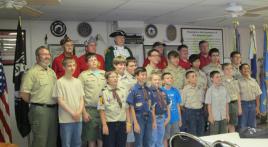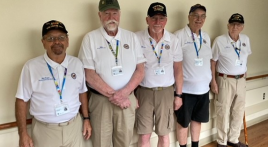Midnight, September 1957, Fort Dix, New Jersey – I am on my hands and knees with a toothbrush in an old Army latrine, attempting the impossible task of cleaning the place.
I attended and taught many leadership classes in the Army, Scouts and education, but the most valuable lesson I ever learned was while cleaning latrines in Army basic training. I was a shy, green teenager of 17, putting on fatigues in my first week. I had enlisted in the regular Army with reluctant permission from my mother. As a small town boy with limited worldly experience, there I was, surrounded by city guys from New York and New Jersey, mostly all older.
The first week went by, and I was still in shock when the barracks sergeant called me out to report to the Company orderly room. Now, that was not a place any one of us wanted to go, because we knew we would be in trouble. The first sergeant informed me the Commanding Officer (CO) wanted to talk with me. OMG! The CO! What had I done? As I stood in front of his desk, literally shaking in my combat boots, he complained that since they had gone through the prior service reservists, National Guard and ROTC dropouts who had failed, he had run out of acting squad leaders, so he was now looking for a Boy Scout. “I see by your 201 file that you’re an Eagle Scout, so I guess you know something about leadership. Congratulations! You’re the new squad leader in your platoon.” Gulp!
My squad of eight were all older guys, including one with a master's in psychology and all very different from me. Their immediate response was one of laughter and derision, and they rubbed it in. To make matters worse, our barracks sergeant assigned us latrine cleaning for our work detail, but as a result of the attitude of my squad, it became a permanent detail.
The first few days were a nightmare. As we were supposed to do our detail after morning chow, my squad basically laughed while I frantically tried to clean. I asked, begged and tried to appeal to their better nature but only got lukewarm responses from two or three of them. In WWII barracks, those latrines were scuzzy and rusty. The first couple of days, our platoon sergeant yelled at me, but the third day, he really got angry and made me report to him after lights out with my toothbrush. Cleaning with a toothbrush, is of course, impossible, and by 1 a.m., he took pity on me and sent me to bed. After a few night of almost no sleep, I became desperate, angry, and then brave enough to ask my sergeant what I should do to get my squad to help. He told me I was in charge, that I was the leader, and responsible to get the job done like an Army mission, no matter what. I asked the sergeant if I could give them extra duty. So I gave him the names of the five worst offenders, and they all went on KP and guard duty. Oh, were they mad! They verbally abused me so badly, that I gave two or three of them more extra duty, and my sergeant backed me up. Finally, they all got the message, and, grudgingly, they helped clean enough that we passed inspection – finally!
I had learned in the Scouts about taking care of my patrol and Explorer Crew and as an experienced camper and hiker, I could offer help to my soldiers in taking care of their feet when we went on a forced march and how to sleep dry when we bivouacked in our pup tents in the rain. We made waterproof sleeping bags from our ponchos and blankets – a scout trick – and my guys were almost the only dry soldiers in the platoon. I had moleskin and tape in my pack to help them fend off blisters. They were beginning to appreciate that I had some skills to make their lives a little more comfortable in the field. Land navigation? No problem. Learned that in the Scouts. We finished the course so quickly that we had a couple of hours to nap under a tree while the others were getting lost. My soldiers began to show me some respect as I was learning about leadership: get the job done first and take care of your soldiers. Later I would use the mantra: “Mission first, people always” in all the leadership classes I would teach.
During our final inspection, we were lined up in the barracks in front of our bunks where you could bounce a quarter. Our gear was laid out in precise formation. The inspecting party marched through. The regimental commander, a crusty old colonel, had a few words with a couple of us and then disappeared into the latrine. He emerged to pronounce it the cleanest latrine he’d ever seen! I heard later that latrines were a pet peeve of his.
My squad stood tall and proud at graduation, and when we said our goodbyes, they each shook my hand and thanked me for teaching them the outdoor stuff, and that for a dumb kid who enlisted, I was “ok.”
P.S. I went on to become a Russian linguist, serve in Germany, and re-enlist in the Army Reserves as a 47-year-old Basic Training instructor. I retired at age 60 at West Point where I was a principal NCOIC of Cadet Basic Training, so my career started in 1956 in Basic Training and ended there in 1998. Wow - full circle!
Latrines and leadership
January 19, 2018
Submitted by:
1st Lt. Peter Duston, (ret.) Cherryfield, Maine



